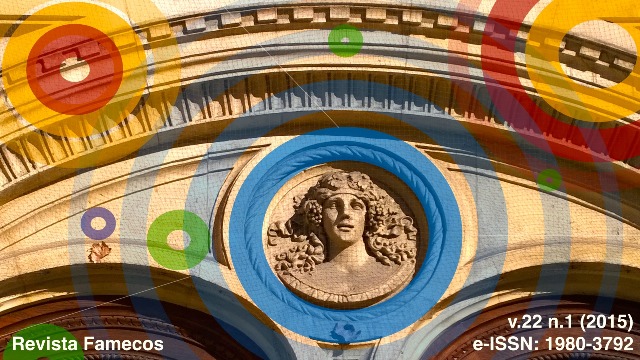The comunicacional war and utopias
DOI:
https://doi.org/10.15448/1980-3729.2015.1.19590Keywords:
Utopia, Asymmetrical War, PerceptionAbstract
This study consists in an analysis of the communicational war, the one faced in the asymmetric confrontations perpetrated by ISIS, the Islamic State. The main goal of these confrontations is not to win the war over the enemy, but to control the public’s perception. These military actions intend on dominating news agency – the terrorist act and the uncontrolled violence are means through which revolutionary groups can draw attention from newsrooms and change public opinion. 41 ongoing conflicts since 2013 are analysed here; their motives are mainly political and religious utopias. Our conclusion leads us to see utopia as one of the main influencers of militant actions in these conflicts.
Downloads
References
ARREGUÍN-TOFT, Ivan. How the weak win wars. International Security, v. 26, n. 1, p. 93-128, summer 2011.
DUNLAP, Charles J. Law and military interventions: preserving humanitarian values in 21st conflicts. Kennedy School of Government, Harvard University, 2001. Disponível em: http://people.duke.edu/~pfeaver/dunlap.pdf Acesso em: 5 jul. 2014.
ECHEVARRIA, J. A. Fourth Generation War and Other Myths. Strategic Studies Institute, 2005.
GOULDING Jr., Vincent J. Back to the Future with Asymmetric Warfare. Parameters, p. 21-30, Winter 2000-2001. Disponível em:
http://strategicstudiesinstitute.army.mil/pubs/parameters/Articles/00winter/goulding.htm Acesso em: 5 jul. 2014.
HAMMES, Thomas X. The Sling and the Stone: On War in the 21st Century. Zenith Press, 2004.
HEIDELBERG INSTITUTE FOR INTERNATIONAL CONFLICT RESEARCH. Conflict Barometer 2013. 2014. Disponível em: http://hiik.de/de/downloads/data/downloads_2013/ConflictBarometer2013.pdf Acesso em: 8 jul. 2014.
HOFFMAN, F. G. 4GW as a Model of Future Conflict. Boyd 2007 Conference. 13 de julho de 2007.
IMPERIAL AND ROYAL AUSTRO-HUNGARIAN MARINE CORPS. Fourth Generation War, 2008. Disponível em: http://www.dnipogo.org/fcs/pdf/fmfm_1-a.pdf Aceso em: 7 jul. 2014.
LEE, Min Goo. The just war tradition and utopian political thought. E-International Relations. 2014. Disponível em: http://www.e-ir.info/2014/07/11/the-just-war-tradition-and-utopian-political-thought Acesso em: 5 jul. 2014.
LIND, William; NIGHTENGALE Keith; SCHMITT, John F.; SUTTONE, Joseph W.; WILSON, Gary I. The Changing Face of War: Into the Fourth Generation. Marine Corps Gazette, Oct, 1989.
MACK, Andrew. Why big nations lose small wars: the politics of asymmetric conflict. World Politics, v. 27, n. 2, p. 175-200, 1975. Disponível em: http://web.stanford.edu/class/polisci211z/2.2/Mack%20WP%201975%20Asymm%20Conf.pdf Acesso em: 10 jul. 2014.
MANNHEIM, Karl. Ideology & utopia. Harvest, 1985.
MANDEL, Robert. Reassessing Victory in Warfare. Armed Forces & Society, v. 33, n. 4, p. 461-495, 2007.
MOYN, Samuel. The last utopia: human rights in history. The Belknap Press of Harvard University Press, 2010.
PETRAEUS, David H. Multi-National Force-Iraq Comdander’s Counteringsurgency Guindance. Military Review, Sept.-Oct., 2008.
Disponível em: http://usacac.army.mil/CAC2/MilitaryReview/Archives/English/
MilitaryReview_20081031_art004.pdf Acesso em: 14 jun. 2014.
RONFELDT, David et al. The Zapatist Social Netwar in Mexico. Rand’s Arroyo Center, 1998. Disponível em: http://www.rand.org/content/dam/rand/pubs/monograph_reports/1998/MR994.pdf Acesso em: 20 jun. 2014.
STEPANOVA, Ekaterina. Terrorism in Asymmetrical Conflict. Ideological and Structural Aspects. Stockholm International Peace Research Institute. Research Report n. 23. Oxford University Press, 2008.
WAINBERG, Jacques A. O discurso utópico e o poder persuasivo da violência. In: Revista Comunicação e Sociedade, São Bernardo do Campo, v. 35, n. 2, p. 71-91, jan./jun. 2014.
______. Revolucionários, mártires e terroristas: a utopia e suas consequências. Ed. Paulus, 2015, (no prelo).
WALZER, Michael. Just and Unjust Wars. Basic Books, 2007.
Downloads
Published
How to Cite
Issue
Section
License
Copyright
The submission of originals to Revista Famecos implies the transfer by the authors of the right for publication. Authors retain copyright and grant the journal right of first publication. If the authors wish to include the same data into another publication, they must cite Revista Famecos as the site of original publication.
Creative Commons License
Except where otherwise specified, material published in this journal is licensed under a Creative Commons Attribution 4.0 International license, which allows unrestricted use, distribution and reproduction in any medium, provided the original publication is correctly cited.






